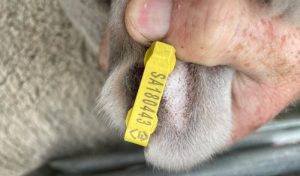 A 47.5-CENT sheep and goat electronic ear tag discount for South Australian producers has been extended for two years by the SA Government.
A 47.5-CENT sheep and goat electronic ear tag discount for South Australian producers has been extended for two years by the SA Government.
The expanded EID device rebate (2025-2027) will provide a 25 percent rebate up to 47.5 cents per tag until 30 June 2027.
The Malinauskas Government said the extension was made possible from an additional $4.5 million in funding from the State Government’s $73 million drought support package.
The point-of-sale EID tag discount scheme was due to end on 30 June 2025, but has been extended for two years in recognition of the hardship many producers are facing due to the drought.
From 1 July 2025, sheep and goat producers will be able to purchase National Livestock Identification System-approved EID tags receiving a 47.5 cents discount at the point of sale for the respective year of birth colour – white (2025), orange (2026) or light green (2027).
In addition to the point-of-sale tag discount, eligible SA producers will be able to apply for EID device rebates for NLIS-accredited tags that fall outside of the year of birth colour scheme.
As agreed nationally, South Australia is moving from the current visual device and mob-based approach to individual EID for sheep and farmed goats to improve traceability and better protect the state’s $4.9 billion livestock industry.
As of 1 January 2025, all sheep and farmed goats born must be tagged with an NLIS-accredited EID tag before leaving their property of birth. All other sheep and farmed goats must be EID tagged from 1 January 2027 before leaving the property.
SA Minister for Primary Industries and Regional Development Clare Scriven said the transition to EID tags for sheep and farmed goats is well underway as of the beginning of this year.
“These tags are essential to not only improve the traceability of livestock but will also allow us to respond to and recover from a biosecurity outbreak such as foot and mouth disease.”
Livestock SA chief executive officer Travis Tobin said the announcement was important to assure livestock producers and the broader industry that there would be no interruption to tag assistance.
“Producers across South Australia are doing it tough, with lowest-on-record rainfall for successive years so any measures that help reduce the cost of doing business help,” he said.
“That said, the transition to sheep and goat EID is one of the most significant changes in small stock for some time and more support was still needed.
“Livestock SA continues to call for a broader $11.8 million Stage 2 EID implementation package that includes tag rebates for the next three years, funding to support double-tagging of older sheep and regional training to assist with adoption and compliance,” he said.
“With compliance activities scheduled to start on 1 July, we also need to better understand the government’s approach to missing or non-reading tags, and implications for parts of the supply chain that may not be ready – we haven’t seen any details around this yet.
“We will continue working constructively with the government to see the full Stage 2 package delivered, which will help ensure a smooth transition to eID across the supply chain,” Mr Tobin said.
To view the EID implementation timeline and for more information about the support available for producers visit: www.pir.sa.gov.au/eid
For information on the Drought Support Package, visit pir.sa.gov.au/drought-support.

HAVE YOUR SAY